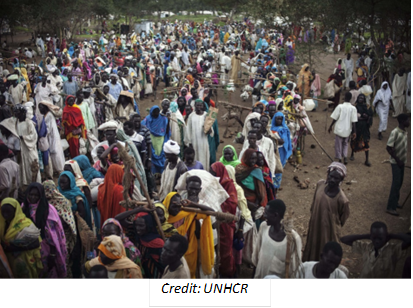UK and US Governments failing to recognise deliberate starvation of civilians as a weapon of war

new Guidance has been released by international human rights law firm and foundation, Global Rights Compliance, to stimulate and accelerate governments, including the UK and the US, in formally recognising the deliberate use of starvation of civilians as a weapon of war, or risk the lives of several more millions in the world’s most deprived, dangerous and forgotten countries.
In December 2019, 123 countries party to the International Criminal Court unanimously approved the historic Rome Statute ‘Starvation’ Amendment, which, for the first time, enabled the international investigation and prosecution of the war crime of starvation in domestic armed conflicts. Despite unanimous approval for the Amendment, ratification by governments around the world has been slow. Exactly three years on from the Amendment, 11 countries have now ratified or accepted the Amendment, including the Kingdom of the Netherlands and Switzerland,[1] yet more ratifications are needed. Switzerland led the Amendment campaign and continues to champion its ratification.
The latest international call to recognise and condemn deliberate starvation crimes came last week in Germany, where the starvation of millions of Ukrainians under Joseph Stalin, the Holodomor, was formally judged to be a “genocide” in an effort to serve as a warning to Russia, as global fear spreads that starvation is being used and will continue to be used as a weapon of warfare against Ukrainian people in the coming weeks and months. Germany is the next country expected to ratify the Starvation Amendment, with the ratification process underway.
Conflict is the biggest driver of hunger, with 60 percent of the world’s hungry living in areas afflicted by war and violence[2], but starvation is often mistaken to be an inevitable collateral consequence of war. Recent years have seen an alarming rise in the evidence of man-made starvation deliberately used as a weapon of war against civilians in Yemen, Syria, South Sudan, Somalia, Ethiopia, and Ukraine.
Global Rights Compliance worked closely with the Swiss government to secure the historic Rome Statute Starvation Amendment in December 2019. While the Starvation Amendment was a crucial step forward in helping millions suffering from man-made starvation and holding perpetrators of war crimes to account, parties to the International Criminal Court must also ratify the Amendment for it to have legal effect and enter into force.
The new Guidance released by Global Rights Compliance, supported by the Netherlands, will assist and empower advocacy groups and civil society organisations [CSOs], who play a key role in the global fight to eradicate hunger, to place pressure on governments and decision makers to ratify the Amendment. The Guidance includes, among other elements, advice for CSOs and others to engage with government decision makers. It also includes a Ratification Guidebook, supported by Switzerland – which is a key, standalone resource more effectively about the Starvation Amendment and how best to achieve its ratification and implementation, as well as model letters to accelerate government action.
Widespread ratification of the Amendment is needed to promote the prohibition on starvation as a weapon of war at a domestic level, strengthen the deterrent nature of international criminal law, send a strong message that justice will be pursued for perpetrators of starvation-related crimes and ultimately protect the most vulnerable caught up in the horrors of war. Widespread ratification will also protect humanitarian workers who are often subject to obstruction, intimidation, harassment, and even targeted attacks as warring parties seek to restrict civilians’ access to food, water and other basic humanitarian aid.
Catriona Murdoch, Partner and Head of Starvation Portfolio at Global Rights Compliance, who has led previous investigations and legal submissions in relation to Yemen, Syria and Tigray in Ethiopia, commented:
“Parties to the International Criminal Court have an opportunity to act and call out the suffering of innocent victims of deliberate state-led conflict-induced hunger. There is no room for excuses and State Parties must do their duty and hold perpetrators to account for the use of starvation in war, so they cannot continue to act with impunity. Through our investigations, we are seeing this crime being waged in current and recent conflicts, we must condemn deliberate starvation and equip those with an investigative or prosecutorial mandate to act.
“Pressure is needed to catalyse governments to take a stand against the barbaric and tragic crime of intentional starvation. The launch of our new Starvation Guidance is a springboard to accelerate ratification of the Starvation Amendment. It should not be acceptable for starvation to be viewed as an inevitable consequence of war.”
The Guidance publication follows the recent first of its kind report published by Global Rights Compliance in November 2022 on state-led deliberate starvation in South-Sudan. The investigation revealed that starvation is being used as a ‘method of warfare’ in South Sudan and was the first to call on the international community to intervene by demanding that starvation crimes in South Sudan are recognised as violating international law, and that perpetrators of war crimes are brought to justice.






